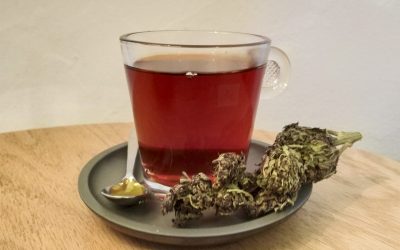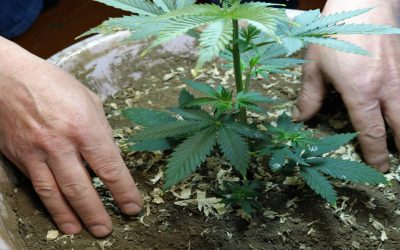We’ve all experienced it: you’ve smoked the perfect joint, taken a well-timed dab, or indulged in an artisanal edible. But suddenly, those pleasant sensations turn uncomfortable—your laughter becomes heavy, and you start to wonder, “Am I too high?” No, you’re not dead; you’ve just reached that moment of realization: “I’m too high.”
Maybe that edible took longer than expected to kick in. Perhaps you held that bong hit a little too long to impress your friends. It could be your first time trying concentrates, and their potency caught you off guard. Or maybe you simply have a low tolerance.
It can happen in countless ways, but once it hits, the experience can be unsettling, enough to deter even the most experienced cannabis enthusiasts. Fortunately, cannabis isn’t fatal, and its effects typically subside within a day. Here are the ways to sober up from being too high from weed.
How Long Does It Take for the Effects of Marijuana to Fade?
The duration it takes to return to sobriety after using marijuana varies due to several factors: how it was consumed, the amount taken, and individual traits such as tolerance, age, and metabolism.
How to get less high? Generally, the potency of the cannabis product, measured in THC content, influences how long the high lasts, though its intensity may not always align. Concentrated forms like dabs have the highest potency, followed by flower and edibles.
As a result, coming down from dabs might take longer than from smoking a bowl, but factors like dosage, quality of the product, and personal biology all play a role. Notably, individuals who use cannabis regularly and have built a tolerance tend to recover more quickly than occasional users. Recent research suggests a “window of impairment” spanning three to ten hours across different consumption methods, with the average being around four hours for most people.
Typically, the peak of a cannabis high occurs between 30 minutes to two hours after consumption, with lingering effects extending beyond that timeframe, occasionally prolonging the experience. Fortunately, there are methods to alleviate feelings of excessive intoxication, overwhelm, or discomfort resulting from heavy cannabis use.
Recognizing Signs of Overconsumption
Identifying when you’ve had too much to smoke can be quite obvious, but if you’re uncertain about where to draw the line, there are some unmistakable indicators to watch for. While having a good time is enjoyable, it might be time to ease off if you experience:
- Feelings of anxiety
- Nausea
- Dizziness
- Panic
- Paranoia
- Confusion
- Excessive sweating
Understanding the Effects of Overindulgence
How to get rid of a high? Even when it feels overwhelming, remember, you’re still very much alive. The high induced by marijuana primarily stems from THC, which interacts with the CB1 receptors in our endocannabinoid systems, predominantly in our brains. In essence, it’s largely a mental experience! Consuming excessive THC isn’t fatal, and it doesn’t affect the brain regions responsible for regulating breathing.
THC’s presence in our systems can bring about sensations of relaxation, drowsiness, increased appetite, euphoria, and clumsiness. However, the extensive range of strains and products makes it challenging to predict when a high becomes too intense. In rare instances, such as individuals experiencing cannabis hyperemesis syndrome, feelings of nausea or dizziness may arise. Fortunately, these effects typically subside with time.
Fast Ways to Become Less High from Cannabis
How to stop being high? Here are some strategies for rapidly reducing the effects of cannabis:
Keep Calm
Recall the timeless wisdom from Hitchhiker’s Guide to the Galaxy: “Don’t panic.” Remind yourself that you’re alright, and everything will be okay.
Most symptoms of overindulging in cannabis, often referred to as “greening out,” typically subside within a matter of minutes to hours, leaving you with nothing more than a bit of drowsiness and possibly an empty fridge. Simply give it some time, and these sensations will gradually fade away.
It’s worth emphasizing that despite any feelings of anxiety or perspiration, there have been no recorded fatalities from cannabis overdose throughout history. Therefore, be reassured that you won’t face any severe consequences from excessive intake.
Opt for Water and Light Snacks
To echo the wisdom of Derek Zoolander, water is vital for hydration, and staying hydrated helps you sober up. Whether you prefer water or juice, having a cold beverage at hand, preferably non-caffeinated, can combat dry mouth and allow you to focus on the simple act of sipping and swallowing.
It’s important to clarify that by “hydrate,” we don’t mean “consume alcoholic beverages.” If you’re feeling the effects of cannabis too strongly, steer clear of alcohol, as it can increase THC levels in your blood.
Wondering if eating after smoking weed helps you sober up? Some individuals find that munching on light snacks like fruits, nuts, or cheese helps them feel more grounded. There’s also some research suggesting that terpenes found in both food and cannabis might help moderate the high.
Understand Your Limits Before Consumption
If possible, tailor your cannabis consumption to your tolerance level. If you know that just a couple of puffs from a joint make you anxious, or a small dose of an edible knocks you out, don’t push beyond what’s comfortable for you. While this might not immediately help if you’re already feeling overwhelmed, it can prevent discomfort in the future.
Consume with trusted friends whom you’ve smoked with before, and don’t feel pressured to match their tolerance levels. While making new friends is great, being surrounded by strangers when you’re feeling disoriented isn’t ideal.
Take it slow, especially with edibles. Start with a standard dose, like 10 mg (or even 5 mg as a precaution), and wait at least an hour, if not two, before considering increasing your dosage. The same caution applies to inhalation methods; if you’re used to taking just one hit, don’t join a smoking session where you’ll be puffing continuously for an extended period.
Utilize Black Pepper for Relief from Marijuana Effects
When faced with feelings of paranoia and anxiety due to excessive cannabis consumption, a readily available kitchen staple could offer assistance: black pepper. Embraced by many, including Neil Young, the black pepper remedy involves either sniffing or chewing on a few peppercorns for almost instant relief. Although not scientifically proven, the presence of similar terpenes in black pepper and various cannabis strains suggests potential for its calming effects.
Embrace Tranquility and Rest
In moments of overwhelming discomfort, seek solace in a serene, low-stimulus environment where you can unwind and practice deep breathing. Remind yourself that the intensity of your discomfort is temporary. Inhale deeply through your nose and exhale through your mouth, focusing on the rhythm of your breath. Lie down and allow yourself to relax, perhaps even taking a short nap to rejuvenate if drowsiness sets in. If sleep eludes you, simply find comfort until you feel ready to resume activity.
Take a Stroll to Refresh Your Mind
When unable to quiet your thoughts, consider changing your surroundings and getting some fresh air to reenergize yourself. Ensure you stay within familiar surroundings and have a companion with you to prevent getting lost while feeling anxious. However, if you feel too dizzy or light-headed, opt to lie down instead of taking a walk.
Take a Shower or Bath
While it might not always be an option when you’re away from home or at a friend’s place, consider taking a relaxing shower or bath if you’re at home to help ease the effects of consuming too much marijuana. While there isn’t scientific research specifically on the effects of showering on being high, anecdotal evidence and the known benefits of showers suggest that it can likely help calm your high. Showers are known to relax both the mind and body, and cold showers in particular may help alleviate symptoms of depression and increase alertness.
Distract Yourself!
Engaging in activities that you find enjoyable while high can also be effective in distracting yourself as you come down from your high. Suggestions include watching a funny cartoon, listening to your favorite music, playing video games, chatting with friends, cuddling with your partner, trying out calming activities like coloring, indulging in tasty snacks, or running errands with someone’s supervision. Choose activities that evoke positive emotions to help your mind focus on feeling safe and comfortable.
Sobering Up from Edibles
The effects of edibles can be quite different from those of smoking, vaping, or dabbing due to the way the body metabolizes them. Edibles produce longer-lasting highs because THC undergoes liver metabolism during digestion, prolonging its effects. Not all methods for sobering up from smoking marijuana may work for edibles. However, staying calm, staying hydrated, distracting yourself, eating a substantial meal to maintain metabolism, consuming CBD edibles to counteract the effects, or taking a nap can be helpful strategies.
Sobering Up from Delta-8
How to stop feeling high? The emergence of hemp-derived delta-8 THC has introduced new possibilities for marijuana consumption, including the risk of overconsumption. Unlike delta-9 THC, delta-8 is less intoxicating per milligram, often referred to as “diet weed” because it’s milder and less likely to cause overconsumption. While experiences with delta-8 may vary, some find it enjoyable with activities like listening to music or being creative, making it easier to manage and less likely to lead to overwhelming effects.
Additional Techniques to Reduce the Effects of a Marijuana High
- Bonus tip #1: Try using CBD to counteract excessive THC consumption. CBD is renowned for its anxiety-relieving properties and can help moderate the impact of THC by adjusting receptor signaling. Unlike THC, CBD doesn’t strongly attach to the brain’s CB1 receptors, offering a stabilizing influence that may diminish the intensity of the high.
- Bonus tip #2: Utilize lemons to assist in sobering up. The zesty scent and flavor of lemon, containing the terpene limonene, could potentially alleviate anxiety. Simply inhale the aroma of freshly sliced lemon or consume lemon juice to potentially counterbalance the overwhelming effects of being too high.
- Bonus tip #3: Explore the option of taking ibuprofen to alleviate certain THC-related symptoms. Research indicates that ibuprofen might help alleviate specific discomforts associated with THC consumption. If accessible, take a safe dose of ibuprofen with water and food to ease the discomfort of a cannabis high.
If none of the aforementioned methods yield results and you’re experiencing significant discomfort, seeking medical assistance is a sensible choice. Regardless of legal considerations, healthcare professionals prioritize your well-being and can provide assistance for cannabis-induced anxiety. Remember, they’re dedicated to your health and won’t pursue legal action for seeking help.
Hopefully, these recommendations provide relief and help diminish the severity of your cannabis high. (As a humorous last resort, you might consider following Snoop Dogg’s amusing suggestion and “putting your face in mayonnaise.”)










0 Comments